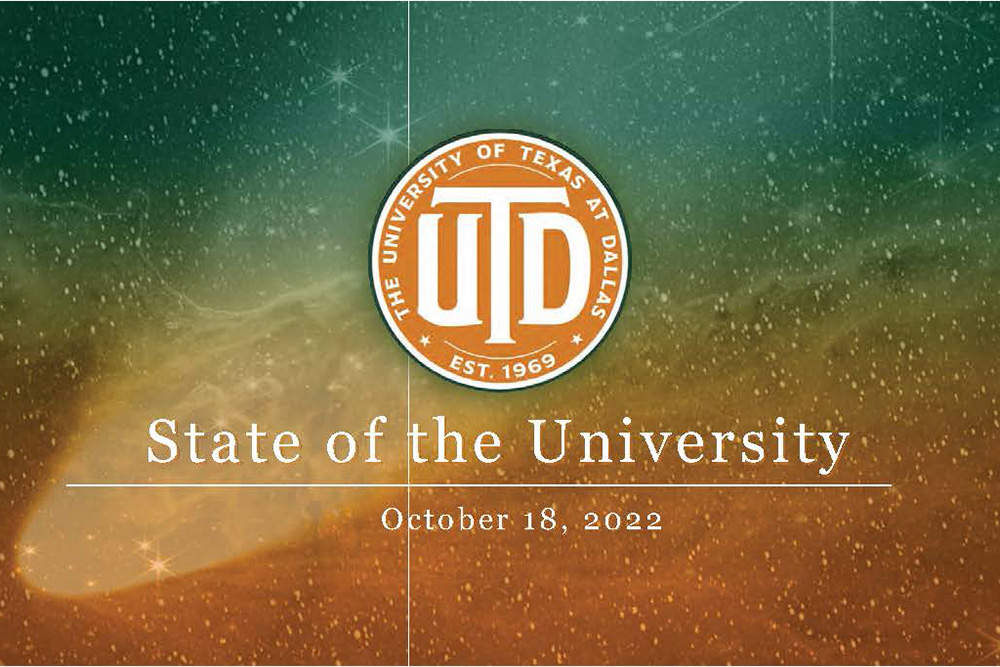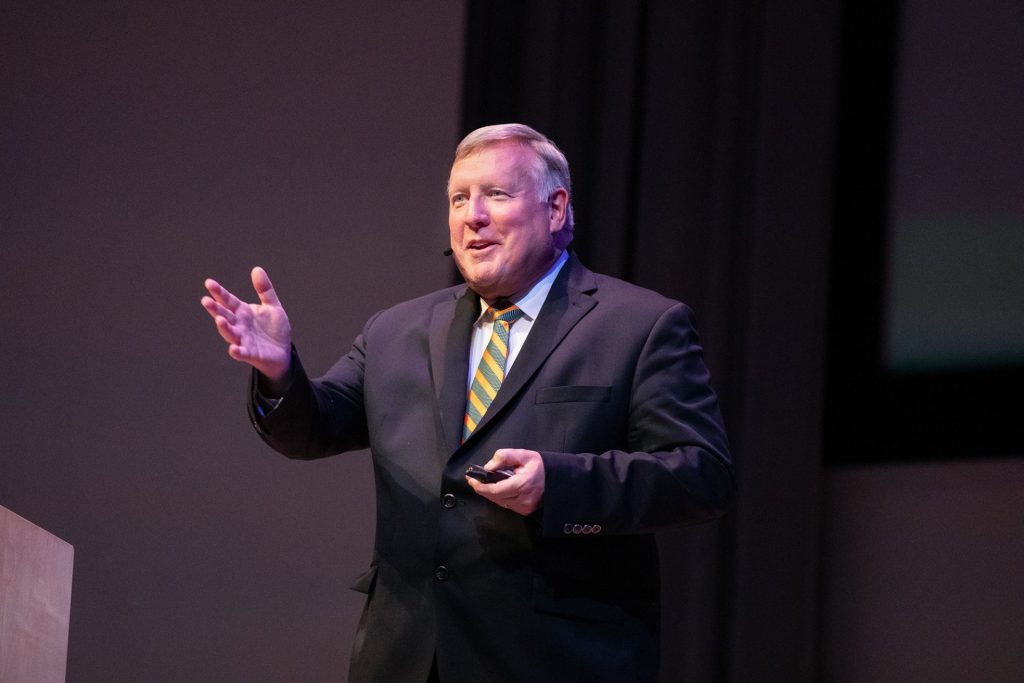
The University of Texas at Dallas is making significant strides as a top-tier institution for innovation and investment, UT Dallas President Richard C. Benson said in his recent annual State of the University address.
UTD, which continues to rank as one of the fastest-growing universities in the country, set an enrollment record this fall with 31,570 students; attracted a record number of philanthropic gifts; and expanded its equity efforts and research collaborations in the past year.
Benson, the Eugene McDermott Distinguished University Chair of Leadership, said enrollment recovered well from a pandemic dip, with an overall increase of 6% from last fall and record numbers of first-time-in-college freshmen and graduate students. Graduate student enrollment increased to 9,955, and freshman enrollment hit 4,220.
“People vote with their feet,” he said. “No one is obligated to send their tuition dollars to UTD. But to an ever-increasing extent, people are choosing to come to UT Dallas.”
“I fully expect UT Dallas to always be on that path of innovation. Together, with our partners, we will create a future that benefits us all.”
UT Dallas President Richard C. Benson
Benson attributed the growth to dynamic faculty, expanding facilities and increasing research opportunities.
The president noted the quality of this year’s new faculty, which included 43 tenured and tenure-track professors. He said a new UTD faculty-hiring initiative aims to expand the number of tenured or tenure-track faculty members by at least 50 over the next three years. The positions are in addition to new faculty hired to replace departing or retiring faculty members.
At the same time, Benson said leaders have developed and implemented training and resources to advance equity in faculty hiring. A three-year, $1 million National Science Foundation ADVANCE grant is helping to enhance efforts to recruit and retain more women tenure-system faculty members in the STEM fields.
In addition, UT Dallas joined the American Association for the Advancement of Science’s STEMM Equity Achievement (SEA) Change initiative as a charter member. The program implements a self-assessment process to effect sustainable change with regard to diversity, equity and inclusion in science, technology, engineering, mathematics and medicine (STEMM) at U.S. institutions of higher education.
In his presentation, Benson also highlighted the new buildings that will expand UTD’s research and art footprint — the Texas Instruments Biomedical Engineering and Sciences Building, which will be shared with UT Southwestern Medical Center on its East Campus, and the Edith and Peter O’Donnell Jr. Athenaeum on the south side of the Richardson campus.

Here are some key statistics that UT Dallas President Richard C. Benson highlighted during the State of the University:
Fall Enrollment: 31,570
Federal Research Expenditures: $61 million (AY22)
Endowment: $743 million
Read the rest of the highlights from the presentation (PDF).
“The arts are really important to our students — to listen to it, see it, or to create it,” Benson said. “The Athenaeum is going to be a significant new addition to the whole environment of UTD, completely changing UT Dallas in a wonderful way.”
The president also noted the success of the ongoing New Dimensions: The Campaign for UT Dallas. Its goal is to raise $750 million to attract the best and brightest students, enhance lives through transformative research and transform the arts on campus. Thus far, the campaign has raised $317 million. Nearly 18,000 donations totaling $76.2 million were made last year, making it one of the most successful fundraising years in UT Dallas history.
Benson said UTD is seeking additional funding from private philanthropy and the state for two new buildings — a new student union and a multidisciplinary science and technology building.
The president also shared how UTD has made great progress in becoming a center of innovation for North Texas, providing support for commercialization and economic growth as well as research that will help solve some of the world’s greatest challenges. Federal research expenditures are up 68% since 2017, which Benson said is a major accomplishment.
In a video shown during the event, Dr. Joseph Pancrazio, UT Dallas vice president for research and innovation and professor of bioengineering, said UTD makes a tremendous effort to move innovations from the research bench to the marketplace.
“The world is at a point where it absolutely requires public institutions to do more than educate the next generation,” he said. “They have to be part of the economic development that goes on, both regionally and internationally.”
As evidence of UT Dallas’ commitment to innovation and research, Benson cited the University’s activity in technology commercialization, including $4.6 million in license revenue, 274 active patents, 227 patents pending, 61 active licenses/options, and five UTD-affiliated startups acquired or merged in the last 18 months via venture transactions.
The president also highlighted the Richardson Innovation Quarter, which is home to five UTD research centers. He also announced the new Center for Harsh Environments Electronics, where research focuses on methods to harden semiconductors against both natural and human-made assaults. The University has committed 2,000 square feet of lab space and has hired new researchers for the center, which will support the research and development goals of the recently approved CHIPS (Creating Helpful Incentives to Produce Semiconductors) for America program.
“I fully expect UT Dallas to always be on that path of innovation,” Benson said. “Together, with our partners, we will create a future that benefits us all.”
Additional Speakers
Other speakers at the event were Dr. Ravi Prakash, speaker of the faculty for the Academic Senate and professor of computer science; Megha Hooli, a business analytics graduate student and president of the Graduate Student Assembly; Student Government president and cognitive science junior Kruthi Kanduri; and Staff Council president Jennifer Klunk, program coordinator in mechanical engineering.
Each speaker’s video presentation is available on UT Dallas’ YouTube channel and the State of the University webpage.
